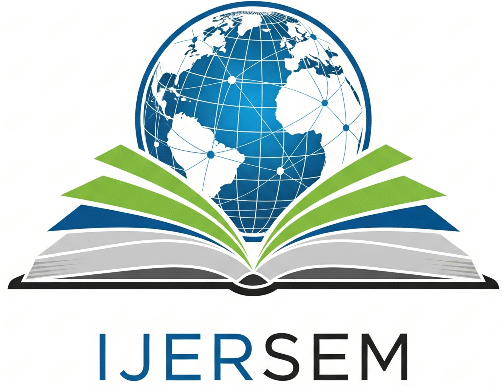International Journal of Emerging Research in Science, Engineering, and Management
Vol. 1, Issue 3, pp. 06-11, September 2025.
This work is licensed under a Creative Commons Attribution 4.0 International License.
Talent Management Strategies for Employee Retention in the Era of Digital Transformation
M. Manivannan
K. Subramanyam
J. Venkatagiri
Associate Professor, Department of CSE, Siddharth Institute of Science and Technology, Puttur, India.
Associate Professor, Department of ECE, Gokula Krishna College of Engineering, Sullurpet, India.
Department of CSE, Ramaiah University of Applied Sciences, Bengaluru, India
Abstract: This study examines the impact of talent management strategies on employee retention during digital transformation in the service sectors of Karnataka, India. It employs a quantitative research design using a structured 5-point Likert scale questionnaire administered to 357 employees and middle managers across telecommunications, banking, and information technology industries. Grounded in New Institutional Theory, the research analyzes data through Structural Equation Modeling (SEM) in SMART PLS 4.0 to assess the relationships between talent management, transformational leadership, resistance to change, digital transformation, and employee retention. The findings confirm that effective talent management significantly drives digital transformation success (β = 0.62, p < 0.001) and that transformational leadership positively moderates this relationship (β = 0.30, p = 0.008), facilitating smoother adoption and reducing resistance. Although resistance to change has a negative impact on digital transformation (β = -0.28, p = 0.032), it did not significantly mediate the relationship between talent management and digital transformation. Digital transformation was found to have a positive influence on employee retention, as evidenced by increased job satisfaction and organizational commitment (β = 0.55, p < 0.001), with transformational leadership playing an indirect role in supporting retention. The model explains 67% of the variance in digital transformation success and 54% of the variance in retention intention, highlighting the importance of integrating strategic talent management and visionary leadership to sustain a competitive advantage in digitally evolving workplaces.
Keywords: Talent Management, Digital Transformation, Employee Retention, Transformational Leadership, Resistance to Change, Digital Skills Development.
References:
- J. Mahroof, A. Rafi, and A. Ahmad, “Talent Management during Digital Transformation: Role of Transformational Leadership and Resistance to Change,” Technology in Society, p. 102964, Jun. 2025, doi: 10.1016/j.techsoc.2025.102964.
- J. M. M. Guerra and I. D.-D. Valle, “Exploring organizational change in the age of digital transformation and its impact on talent management: trends and challenges,” Journal of Organizational Change Management, Jun. 2024, doi: 10.1108/jocm-10-2023-0419.
- S. Atay, C. T. Müftüoğlu, N. Gülmez, and M. Şahin, “Society 5.0 and Human-Centered Technology: Redefining Talent Management in the Digital Age,” Sustainable Futures, p. 100733, May 2025, doi: 10.1016/j.sftr.2025.100733.
- P. Banerjee and N. Sharma, “Digital transformation and talent management in industry 4.0: a systematic literature review and the future directions,” The Learning Organization, Dec. 2024, doi: 10.1108/tlo-10-2023-0183.
- C. Zhong and N. Feng, “Decent work in the Digital Era: How enterprise privacy and data rights protection enhance employee well-being,” International Review of Economics & Finance, p. 104587, Sep. 2025, doi: 10.1016/j.iref.2025.104587.
- P. Gupta, G. Lakhera, and M. Sharma, “Examining the impact of artificial intelligence on employee performance in the digital era: An analysis and future research direction,” The Journal of High Technology Management Research, vol. 35, no. 2, p. 100520, Oct. 2024, doi: 10.1016/j.hitech.2024.100520.
- Y. Liu, N. Zeng, E. Papadonikolaki, K. Maritshane, and P. W. Chan, “The future of digitalized project practices through data-savvy talent: A digital competence formation perspective,” Project Leadership and Society, vol. 5, p. 100120, Mar. 2024, doi: 10.1016/j.plas.2024.100120.
- T. Galanti and S. Fantinelli, “Managing the future of talents: digital innovation in learning organizations,” The Learning Organization, Jun. 2024, doi: 10.1108/tlo-06-2023-0096.
- H. Li, Y. Yu, F. Liu, and B. Zhou, “Multi-path adjustment in digital transformation and enhancement of enterprise competitiveness,” Journal of Innovation & Knowledge, vol. 10, no. 4, p. 100735, May 2025, doi: 10.1016/j.jik.2025.100735.
- C. Cao, D. Zeng, Q. Wan, and Y. Li, “Employee Satisfaction and Digital Transformation: Evidence from China’s Top 100 Best Employers List,” Journal of Asian Economics, vol. 94, p. 101791, Jul. 2024, doi: 10.1016/j.asieco.2024.101791.
- W. Xi and X. Ling, “Can the digitalization of tax administration promote corporate digital transformation? Empirical evidence from China,” International Review of Economics & Finance, vol. 104, p. 104634, Sep. 2025, doi: 10.1016/j.iref.2025.104634.
- C. B. Chrusciak, A. L. Szejka, and O. Canciglieri Junior, “Integrating Digital Transformation with Human-Centric Factors Strategies to Enhance Organisational Process Performance: The H.O.P.E. Model,” Journal of Industrial Information Integration, p. 100785, Feb. 2025, doi: 10.1016/j.jii.2025.100785.
